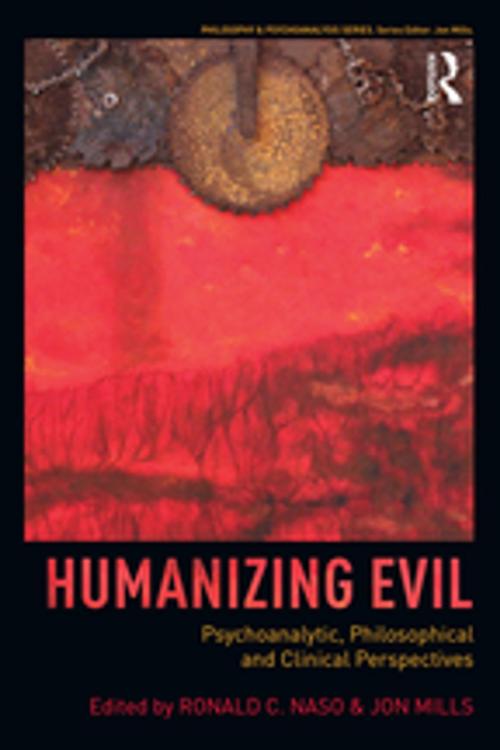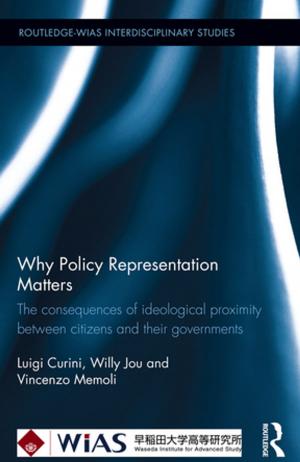Humanizing Evil
Psychoanalytic, Philosophical and Clinical Perspectives
Nonfiction, Religion & Spirituality, Philosophy, Good & Evil, Health & Well Being, Psychology, Pathological Psychology, Ethics & Moral Philosophy| Author: | ISBN: | 9781317503927 | |
| Publisher: | Taylor and Francis | Publication: | December 14, 2015 |
| Imprint: | Routledge | Language: | English |
| Author: | |
| ISBN: | 9781317503927 |
| Publisher: | Taylor and Francis |
| Publication: | December 14, 2015 |
| Imprint: | Routledge |
| Language: | English |
Psychoanalysis has traditionally had difficulty in accounting for the existence of evil. Freud saw it as a direct expression of unconscious forces, whereas more recent theorists have examined the links between early traumatic experiences and later ‘evil’ behaviour. Humanizing Evil: Psychoanalytic, Philosophical and Clinical Perspectives explores the controversies surrounding definitions of evil, and examines its various forms, from the destructive forces contained within the normal mind to the most horrific expressions observed in contemporary life.
Ronald Naso and Jon Mills bring together an international group of experts to explore how more subtle factors can play a part, such as conformity pressures, or the morally destabilizing effects of anonymity, and show how analysts can understand and work with such factors in clinical practice.Each chapter is unified by the view that evil is intrinsically linked to human freedom, regardless of the gap experienced by perpetrators between their intentions and consequences. While some forms of evil follow seamlessly from psychopathology, others call this relationship into question. Rape, murder, serial killing, and psychopathy show very clear links to psychopathology and character whereas the horrors of war, religious fundamentalism, and political extremism resist such reductionism.
Humanizing Evil is unique in the diversity of perspectives it brings to bear on the problem of evil. It will be essential reading for psychoanalysts, psychotherapists, philosophers, and Jungians. Because it is an integrative depth-psychological effort, it will interest general readers as well as scholars from a variety of disciplines including the humanities, philosophy, religion, mental health, criminal justice, political science, sociology, and interdisciplinary studies.
**Ronald Naso, Ph.D., ABPP ** is psychoanalyst and clinical psychologist in independent practice in Stamford, CT. The author of numerous papers on psychoanalytic topics, he is an associate editor of Contemporary Psychoanalytic Studies, and contributing editor of Division/Review and Journal of Psychology and Clinical Psychiatry. His book, Hypocrisy Unmasked: Dissociation, Shame, and the Ethics of Inauthenticity, was published by Aronson in 2010.
Jon Mills, Psy.D., Ph.D., ABPP is a philosopher, psychoanalyst, and clinical psychologist. He is Professor of Psychology & Psychoanalysis at Adler Graduate Professional School, Toronto. A 2006, 2011, and 2013 Gradiva Award winner, he is Editor of two book series in psychoanalysis, on the Editorial Board for Psychoanalytic Psychology, and is the author and/or editor of thirteen books including his most recent works, Underworlds: Philosophies of the Unconscious from Psychoanalysis to Metaphysics, and Conundrums: A Critique of Contemporary Psychoanalysis, which won the Goethe Award for best book in 2013.
Psychoanalysis has traditionally had difficulty in accounting for the existence of evil. Freud saw it as a direct expression of unconscious forces, whereas more recent theorists have examined the links between early traumatic experiences and later ‘evil’ behaviour. Humanizing Evil: Psychoanalytic, Philosophical and Clinical Perspectives explores the controversies surrounding definitions of evil, and examines its various forms, from the destructive forces contained within the normal mind to the most horrific expressions observed in contemporary life.
Ronald Naso and Jon Mills bring together an international group of experts to explore how more subtle factors can play a part, such as conformity pressures, or the morally destabilizing effects of anonymity, and show how analysts can understand and work with such factors in clinical practice.Each chapter is unified by the view that evil is intrinsically linked to human freedom, regardless of the gap experienced by perpetrators between their intentions and consequences. While some forms of evil follow seamlessly from psychopathology, others call this relationship into question. Rape, murder, serial killing, and psychopathy show very clear links to psychopathology and character whereas the horrors of war, religious fundamentalism, and political extremism resist such reductionism.
Humanizing Evil is unique in the diversity of perspectives it brings to bear on the problem of evil. It will be essential reading for psychoanalysts, psychotherapists, philosophers, and Jungians. Because it is an integrative depth-psychological effort, it will interest general readers as well as scholars from a variety of disciplines including the humanities, philosophy, religion, mental health, criminal justice, political science, sociology, and interdisciplinary studies.
**Ronald Naso, Ph.D., ABPP ** is psychoanalyst and clinical psychologist in independent practice in Stamford, CT. The author of numerous papers on psychoanalytic topics, he is an associate editor of Contemporary Psychoanalytic Studies, and contributing editor of Division/Review and Journal of Psychology and Clinical Psychiatry. His book, Hypocrisy Unmasked: Dissociation, Shame, and the Ethics of Inauthenticity, was published by Aronson in 2010.
Jon Mills, Psy.D., Ph.D., ABPP is a philosopher, psychoanalyst, and clinical psychologist. He is Professor of Psychology & Psychoanalysis at Adler Graduate Professional School, Toronto. A 2006, 2011, and 2013 Gradiva Award winner, he is Editor of two book series in psychoanalysis, on the Editorial Board for Psychoanalytic Psychology, and is the author and/or editor of thirteen books including his most recent works, Underworlds: Philosophies of the Unconscious from Psychoanalysis to Metaphysics, and Conundrums: A Critique of Contemporary Psychoanalysis, which won the Goethe Award for best book in 2013.















